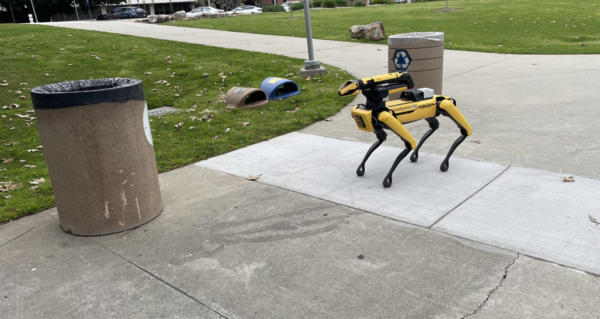A small group of students works with a bright yellow dog in front of Building 8 every Thursday at 4 p.m. The campus dog collects Pepsi cans, but closer inspection reveals it is a robot. Computer science Department Chair Daisy Tang’s undergraduate researchers are working on SPOT, the robot dog.
During the spring semester, a few groups of computer science student-researchers are working with Department Chair Daisy Tang to develop SPOT, a robot dog.
These students are researching Boston Dynamics’ robot. Three work groups focus on the robot’s hardware development, object detection, and picture recognition.

This opportunity allowed computer science student Mark Haddad to network and develop his talents.
“(The research team) all joined the project at the same time, this lets us form groups based on what we found interesting,” said Haddad. “Eventually we figured out what we wanted to do and started.”
These teams can build a foundation they understand and can refer to by using a robot with preexisting software and mechanical functions. Boston Dynamics programs are added to or reworked by the three divisions to achieve their goals.
Group two, which includes computer science student Lina Kang, is designing a program to make SPOT a “trash dog.” Group two is using objection detection and image recognition to tell SPOT to throw away a Pepsi can.
“Each member of group two has gone through probably 300 images and then boxed out and annotated the Pepsi can,” Kang said. “We want SPOT to recognize an object based on its camera view. We’ve been training the dog to recognize this can so it can perform our command when it’s outside.”

George Matta, a computer science student, says the research may sound straightforward, but it’s not.
“This resembles evolution. “We get an output and rate it,” said Matta. “Taking the best output of the new population and making it a parent can create a whole population of different outputs. Like masonry. After graduating with this cutting-edge technology, we’ll apply all our undergraduate experience.
The students hope their early study will lead to technology that will benefit the campus, community, and other computer science students.
SPOT and other campus-wide research initiatives give students the skills they need to succeed in competitive fields. Research experience is vital in computer science, since there are many post-graduate job options.
Kang participated in three aeronautical and SPOT projects in their last semester. Kang learned what computer scientists like and dislike from these roles.
Kang stated, “I think these opportunities are definitely beneficial, and I think every student should take advantage of these programs if they have the time. “I think these opportunities are a good way to figure out where you want to go before entering the workforce.”

